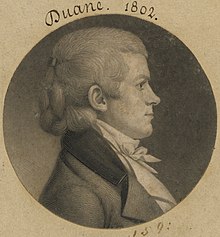William Duane (journalist)
William Duane | |
|---|---|
 | |
| Born | May 12, 1760 |
| Died | November 24, 1835 (aged 75) Philadelphia, Pennsylvania, U.S. |
| Resting place | Laurel Hill Cemetery, Philadelphia, Pennsylvania, U.S. |
| Occupation | journalist, newspaper publisher, author |
William Duane (May 12, 1760 – November 24, 1835) was an Irish-American journalist and newspaper publisher. He founded the Bengal Journal in Calcutta, British India in 1791 but the newspaper was shut down by John Shore, the Governor-General of India due to libel against the French royalist government in exile. Duane founded a second newspaper, The World, but he was arrested and deported for libel by publishing articles critical of the East India Company.
Duane emigrated to the United States and began working at the Philadelphia Aurora and helped elect Thomas Jefferson as the 3rd president of the United States through his newspaper support. He was rewarded for his support of Jefferson with an assignment as adjutant general of the U.S. Army.
Early life[]
While some sources cite his place of birth as Lake Champlain, New York,[1] he was born in St. John's, Newfoundland and Labrador.[2][3] He was born to Irish immigrants Anastasia Sarsfied and John Duane. His father died when Duane was seven and his mother brought the back to Ireland. Duane learned the printing trade as an apprentice in London. He angered his mother and lost the small family inheritance when he married a woman of the Anglican faith, Catherine Corcoran. Duane decided to move to British India.[4]
Career[]
He moved to Calcutta in 1788, and founded the Bengal Journal in 1791. Duane began publishing articles in support of the French Revolution and an unsubstantiated report of the death of Lord Cornwallis during a campaign against Tipu Sultan. The Governor-General of India John Shore, 1st Baron Teignmouth shut down the Bengal Journal for libel against the French royalist government in exile in Calcutta. Duane founded his second newspaper, , which he used to publish articles highlighting how the East India Company functioned in India. These articles again angered John Shore and Duane was arrested and deported for libel in 1794. He returned to London and worked for the Telegraph[4] until he emigrated to the United States.[5][6][7]
Before he died of yellow fever on September 8, 1798,[8][9] Benjamin Franklin Bache hired Duane to work on the Aurora newspaper and printing business.[8] Duane married fellow journalist Margaret Hartman Markoe Bache at the Christ Church in Philadelphia on June 28, 1800. They lived at 316 Market Street some time after their union.
Duane began writing articles in support of Thomas Jefferson's campaign for President. He filed for U.S. citizenship after being threatened with deportation under the Alien and Sedition Act.[4] Jefferson attributed his presidential victory to this paper.[1] Jefferson named Duane a lieutenant colonel, and by the War of 1812 he was an adjutant general. He died in Philadelphia in 1835[1] and was interred at Laurel Hill Cemetery.[10]

William John Duane was his son.
Bibliography[]
- A Hand Book for Infantry: Containing the First Principles of Military Discipline, Founded on the Rational Method Intended to Explain in a Familiar and Practical Manner, For the Use of the Military Force of the United States, The Modern Improvements in the Discipline and Movement of Armies, Philadelphia, 1814
- A Visit to Columbia, in the Years 1822 & 1823, Thomas H. Palmer, Philadelphia, 1826
Citations[]
- ^ Jump up to: a b c Majewicz, Cary. "William Duane (1760-1835)" (PDF). www.hsp.org. The Historical Society of Pennsylvania. Retrieved 23 May 2021.
- ^ "William Duane". www.nps.gov. National Park Service. Retrieved 23 May 2021.
- ^ Little, Nigel (2016). Transoceanic Radical: William Duane. New York: Routledge. Retrieved 23 May 2021.
- ^ Jump up to: a b c Kumar, Anu. "For India's docile media, a lesson in press freedom from 18th century Calcutta". www.scroll.in. Scroll.in. Retrieved 23 May 2021.
- ^ Phillips, Kim T., "William Duane, Philadelphia's Democratic Republicans, and Origins of Modern Politics," Pennsylvania Magazine of History and Biography, Vol. 101 (1977), pp. 365–87.
- ^ Pasley, Jeffery L., "The Tyranny of Printers": Newspaper Politics in the Early American Republic, Charlottesville and London: University Press of Virginia, 2001, pp. 176–95.
- ^ Pasley, Jeffrey L (1 January 2001). ""The tyranny of printers": newspaper politics in the early American republic". University Press of Virginia. Retrieved 9 September 2016 – via Open WorldCat.
- ^ Jump up to: a b "Margaret Hartman Markoe". Independence National Historical Park. U.S. National Park Service. December 1, 2020. Retrieved March 7, 2021.
- ^ Weisberger, Bernard A. (2000). America Afire: Jefferson, Adams, and the Revolutionary Election of 1800. William Morrow. p. 218.
- ^ Records of the Columbia Historical Society, Washington, D.C
External links[]
- 1760 births
- 1835 deaths
- 18th-century newspaper publishers (people)
- 19th-century newspaper publishers (people)
- Adjutants general of the United States Army
- American male journalists
- American expatriates in India
- Burials at Laurel Hill Cemetery (Philadelphia)
- Irish journalists
- Newspaper founders
- People from St. John's, Newfoundland and Labrador
- People of colonial New York
- People of the War of 1812
- American journalist stubs
